In a far off time, that is now inconceivable but was not actually that long ago, in order to share your holiday photos with others, they would have to be printed off and brought with you the next time you visited them. However, the advent of the internet and its various social networking websites has completely changed the way in which we share our personal photographs. Most people currently have no qualms about sharing their most intimate memories, be they of a holiday or a rainy day at home, online with potentially billions of people.
By now we are well aware of the various warnings that are attached to sharing your photos online: they will be saved forever and can never be completely deleted; they can be used against you and put you in a compromising situation; they can be shared and viewed by people that you never intended to see them. However, sharing your photos online now comes with a whole new set of questions and issues: that of ownership.
The popular photo app Instagram is used by millions of people, to share both their professional and personal photographs. However, the terms and conditions of Instagram impact both types of users. After uploading photos to Instagram, you still have ownership over them, however by agreeing to the app’s terms and conditions, you allow the company to use your photos for free, and also for them to give this right to a third party. Therefore, while you may have uploaded the photograph as a way to share your memories with family and friends, the app now has the chance to make money from your private photographs. The same can be said for other social media websites so it is essential to investigate their terms and conditions. It is also important to bear in mind that the terms and conditions of websites are constantly evolving meaning that the way they handle your online content can change quickly.
Instagram’s terms of use can have a detrimental impact on professional photographers who rely on their photographs for a source of income. However, it also means that amateur photographers can find their work being shared on a much larger scale than they ever intended. By using the app, all posters have agreed to this. It is therefore essential that when you upload any photos online, you consider the implications of them being shared by the website that you use, and if you, as many do, disagree with the way that Instagram runs its business, perhaps consider boycotting your use of the app.
However, it is not just prolific sharing of images online that is now a problem. The actual content of the photographs, which may initially seem completely harmless can cause issues, with proposals from the EU that could interfere with people’s freedom of photography. The Freedom of Panorama ruling allows cultural landmarks that are under copyright to be photographed by anyone and used as the subject of their photography. However, in an EU proposal that has since been rejected, this could be compromised by the requirement that photographers must have the permission of the copyright holder to post those photos. This could have serious implications for the use of social networking sites as a way of sharing photographs, as it would effectively render private tourist photos illegal. While this proposal was rejected, it is in place in some countries, such as France and Belgium. It is currently illegal to share photos of the Eiffel Tower at night, as its light show is protected by copyright. If this ruling were to come into law on a larger scale, the repercussions it would have on sharing photos online are enormous, and would have a significant impact on both professional and amateur photographers alike. No longer would you be able to share your tourist photos online, if they depict architecture that is under copyright.
The world of the internet is a difficult one to navigate, and with its protocols and procedures continuously evolving, we must continue to make ourselves aware of what happens to our online content. However, it is equally important to protect our freedom to post online, and to remain vigilant about protecting our online presence.


